My greatest inspiration for this actualization work is “The Mundane Afrofuturist Manifesto,” which, at its foundation, looks toward Blk humanity and community as a means of speculation to (re)imagine the future. In other words, instead of using distant science fiction technology as the access point to build an Afrofuture, Mundane Afrofuturism engages in the “now” space—what we have in this present moment. But don’t be misled by the word “mundane.” This theory and practice still requires the muscles of radical imagination, dreaming, pleasure, and rest found in other branches of Afrofuturism. In doing so, it offers tangible tactics for creating the world we will live in tomorrow.
This is all to introduce my philosophy about “the future.” When I talk about the future, I am thinking, believing, and actualizing a future that doesn’t exist on some distant land, in some distant time, or thanks to some distant technology. The future I’m talking about is here on this very Earth. To quote “The Mundane Afrofuturist Manifesto”: “Earth is all we have. What will we do with it?”
I’ll say it again as it deserves repeating, Blk people exist in the future.
So what does that mean in the context of imagining the future of the theatrical landscape and how do we create it?
In my personal life, I make it a ritual to wish upon dandelions, pennies in a fountain, birthday candles, and 11:11 (twice a day). But I make it my calling to act upon affirmations, recorded dreams, planted seeds, ancestral deeds, and you, and me, and we.
I currently work as the interactive social media manager for National Black Theatre (NBT) in Harlem, New York where a few members of the artistic team, myself included, convene every month for THE DOWNLOAD. This series, as part of NBT @ HOME, is a live conversation to discuss present pulse topics, engage in collective awakening, and help heal the communities we call our own.
In a recent brainstorm meeting for THE DOWNLOAD, we talked about creating an episode about sowing the seeds of the future. But as we were getting lost in the scheming of said future, Sade Lythcott, the theatre’s CEO, reminded us that “culture eats strategy for breakfast.”
That floored me.
In the calls for a revolution of our theatrical institutions and practices, I find myself, and have witnessed others, place a narrow focus on developing strategies, action plans, and revised mission statements. What Sade’s reminder enlightens is that we—theatre practitioners, institution builders, and participants—can strategize all day long, but the culture of white supremacy/insecurity, capitalism, and exhaustion will overrule, outweigh, overpower, and consume strategy every time.
This is not to say that strategy doesn’t have an important place in our collective vision. Strategy includes the essential redistribution and reallocation of resources like money, physical and digital space, opportunities for hiring, programming, and more to make the field more equitable. With strategy, I see a theatre field in which:
- The process of programming shows and hiring those involved in developing and producing them removes barriers of entry and concrete ceilings.
- There are no more “firsts” or “onlys”—titles that ultimately reinforce the tokenization of the marginalized; in this near future, diverse representation and inclusion is a given.
- Broadway is decentralized as a status symbol of “success” and New York theatre is decentralized as the mecca of “legitimate” theatre.
- Regional, local, and community theatre receive investment and intervention in order to expand “the canon” and make them safe for Blk people and minoritized folks to participate.
- Affordable tickets are the standard, which diversifies the age, class, and experience of those who enter and contribute to these spaces.
- The Antonyo Awards, founded in 2020 to recognize and celebrate the excellence of Blk artists in theatre, and other affinity group events are staples of the award season.
… and so much more. I fully acknowledge this list merely scratches the surface of the imagination and I hope it sparks more ideas.
The journey toward the present-future cannot be centered around power and material goods; it must center people and our values as a community, the stories we tell, dreams we make, and futures we actualize through our craft.
What happens once we reach “equity” in resources and power?
It may very well be, even with the best strategies implemented, that the landscape doesn’t feel all that different because the culture didn’t shift. The journey toward the present-future cannot be centered around power and material goods; it must center people and our values as a community, the stories we tell, dreams we make, and futures we actualize through our craft.
For any future to have roots, it needs the fresh, fertile ground of a culture shift.
To me, equity and diversity is about numbers and de jure changes—laws enacted to ensure equitability. Those adjustments can only go so far. The next step is questioning shared values, establishing new ones, and creating a culture of equitability, accessibility, and justice. Those conversations can result in de facto changes—practices that exist in reality even though they are not officially recognized by laws.
Thinking beyond equity (a form of strategy) and into justice (an element of culture), I offer more imaginings of what this field could look like:
- Storytelling that steps away from worship of the written word and into other forms of gathering community.
- Open rehearsal and performance environments that invite and embrace the whole self.
- Stories, spaces, conversations, and dynamics that recognize multiplicity because, as theatremaker Haruna Lee said, “The binary is low-hanging trash fruit.”
- Emergence over urgency in how planning and conflict resolution is approached. We understand that we want as many voices as possible and therefore embrace open conflict and dissent.
- Elimination of progress that only means bigger and requires perfection.
- The abolishment of “award” season and in its place more end-of-season events that recognize, affirm, and celebrate excellence without needing to rank one another.
- Expanding the canon… or we say fuck the canon!
I believe the “future” of this field won’t have a grand reopening or feeling of “we made it.” Rather, one day we’ll realize our shoulders aren’t raised to our ears anymore. Our breath won’t be caged in our ribs, and we will be contributing to and existing in a culture of plenty and abundance.
A pendulum shift in culture is no trifling matter and it requires the collective to radically imagine.
A quick reminder that this is real and that this future doesn’t exist in some distant land, in some distant time, or thanks to some distant technology. The future is closer than many would have us believe.
When we treat theatre for what it actually is—community organizing—it’s more than a mirror for society; it is an experiment for society to try and fail and try again, it is where we see our flaws revealed in open and honest ways and where we give space for open conflict and radical solutions. The content of what we see on stages and screens cannot bear this weight entirely. The container in which the content is made must also fulfill this purpose. It’s time we enthusiastically welcome that responsibility and hold ourselves accountable when we’re merely reflecting and perpetuating the current culture and status quo.
Where do we go from here?
A pendulum shift in culture is no trifling matter and it requires the collective to radically imagine. I invite you to participate in a dreaming session for the future using a Mad Libs/fill-in-the-blanks format. This format is one that my artistic partner, Talia Paulette Oliveras and I—collectively Ta-Nia—often use as a way of allowing participants to insert their own dreams into the storytelling language of the experience.
Write down:
- one of the following: faith, love, hope, peace
- the name of a dimension
- a visual art medium
- a verb ending in -ing
- a mode of transportation outside of the self
- a name of a surface
- a poetic description of that surface
- a name of a body limb
- something that grows
- one of the following: giants, cranes, the great gig
- a cardinal direction
- something in the sky
- an immense measurement of time
- a talking verb in past tense
- a question for your ancestors
- an example of inclement weather or natural disaster
- a poetic description of said inclement weather or natural disaster
- three different states of being
Now for the dream.
With the sun directly above, the only thing that shined was FAITH / LOVE / HOPE / PEACE.
I knew this was going to be a time to investigate the NAME OF DIMENSION—something you don’t get to see when you just look at a VISUAL ART MEDIUM. I just imagined -ING VERB along in a MODE OF TRANSPORTATION, across the NAME OF SURFACE, close to SAME NAME OF SURFACE, so to my perspective it would be almost like it was POETIC DESCRIPTION OF THAT SURFACE.
For today, as much as yesterday and tomorrow, does our future begin.
One NAME OF LIMB in front of the other
toward the edge of what I imagined possible.
Beyond the horizon, SOMETHING THAT GROWS emerged into view
becoming GIANTS / CRANES / THE GREAT GIG in the sky.
I followed.
All the signs pointing CARDINAL DIRECTION.
I traced the sky and kissed the SOMETHING IN THE SKY.
Sliding down the arc of the universe
into the embrace of an IMMENSE MEASUREMENT OF TIME hug.
In perfect tune
I PAST TENSE TALKING VERB to the corner of that SAME SOMETHING IN THE SKY where my ancestors live,
asking them, “QUESTION FOR THE ANCESTORS?”
To which INCLEMENT WEATHER / NATURAL DISASTER occurred,
POETIC DESCRIPTION THE INCLEMENT WEATHER / NATURAL DISASTER.
And I knew exactly what they meant
as I drifted into a new consciousness
feeling STATE 1, feeling STATE 2, feeling STATE 3.

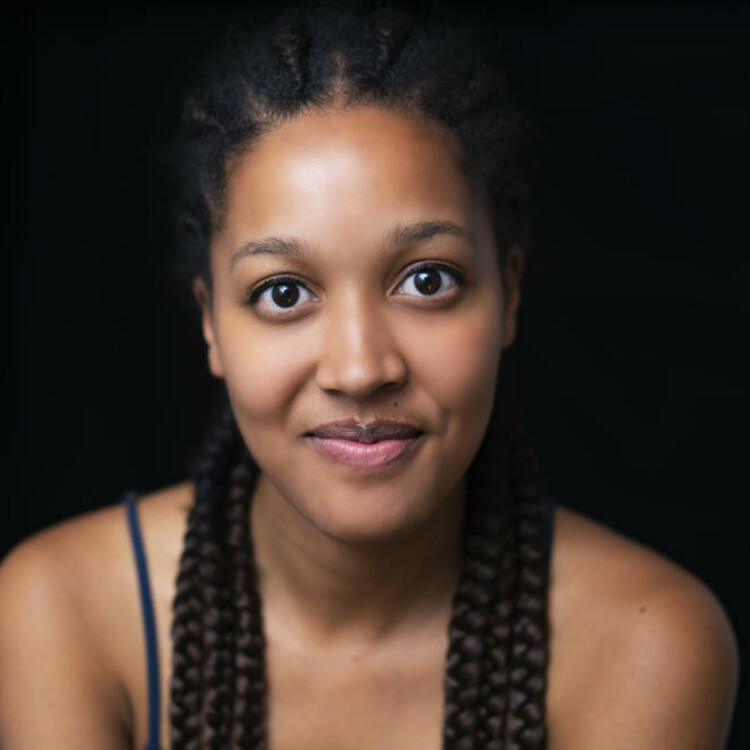
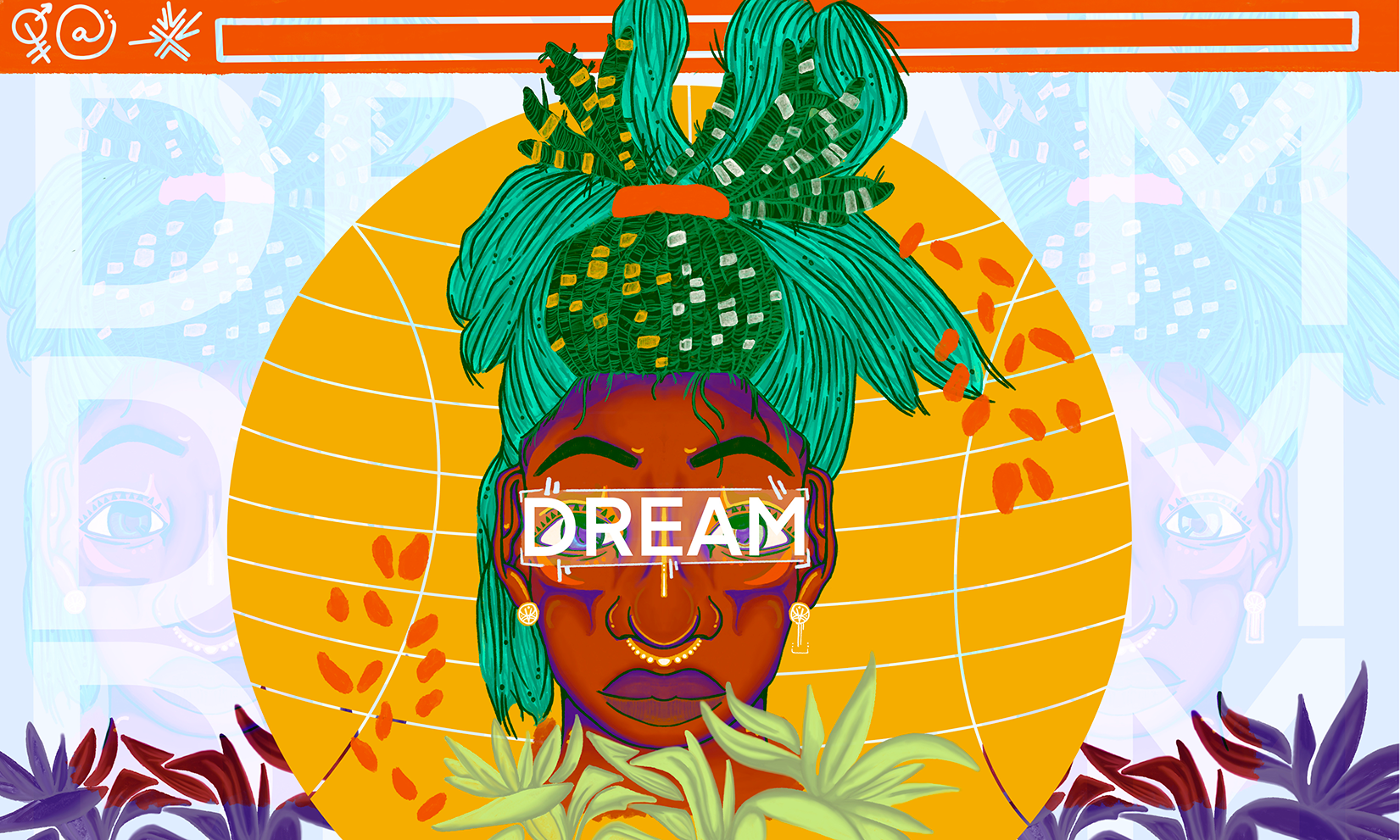

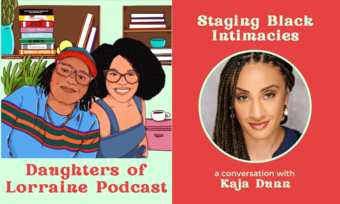



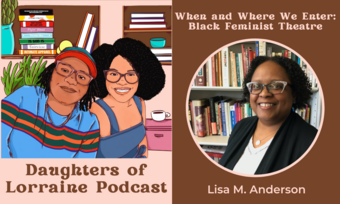
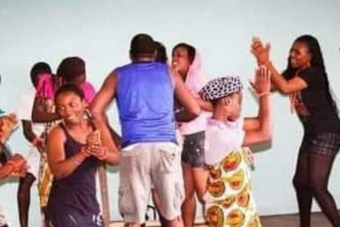


Comments
The article is just the start of the conversation—we want to know what you think about this subject, too! HowlRound is a space for knowledge-sharing, and we welcome spirited, thoughtful, and on-topic dialogue. Find our full comments policy here
A great interactive and informative article that opens our minds to the arts. Through the arts, we can learn our history and culture to build our communities and establish equality. Glad to hear that the young artists were receptive to Sade's advice that you must have financial independence and control of the media to have equality. My good friend Michael Ajakwe created the world's first all web series festival - The Los Angeles Web Series Festival in 2010 for talented artists having difficulty exposing their skills. I really, really enjoyed the dream exercise to create and visualize my dream
Thank You Very Much,